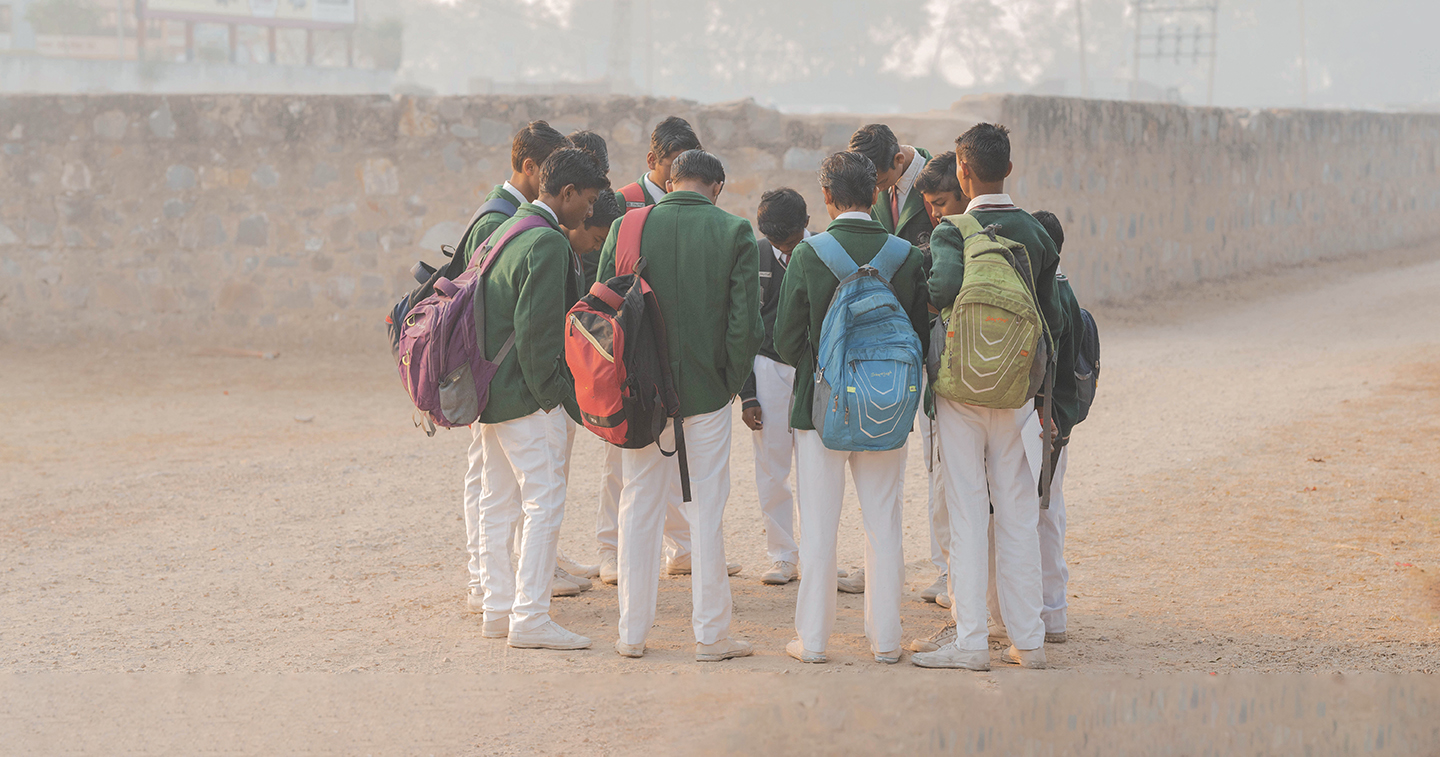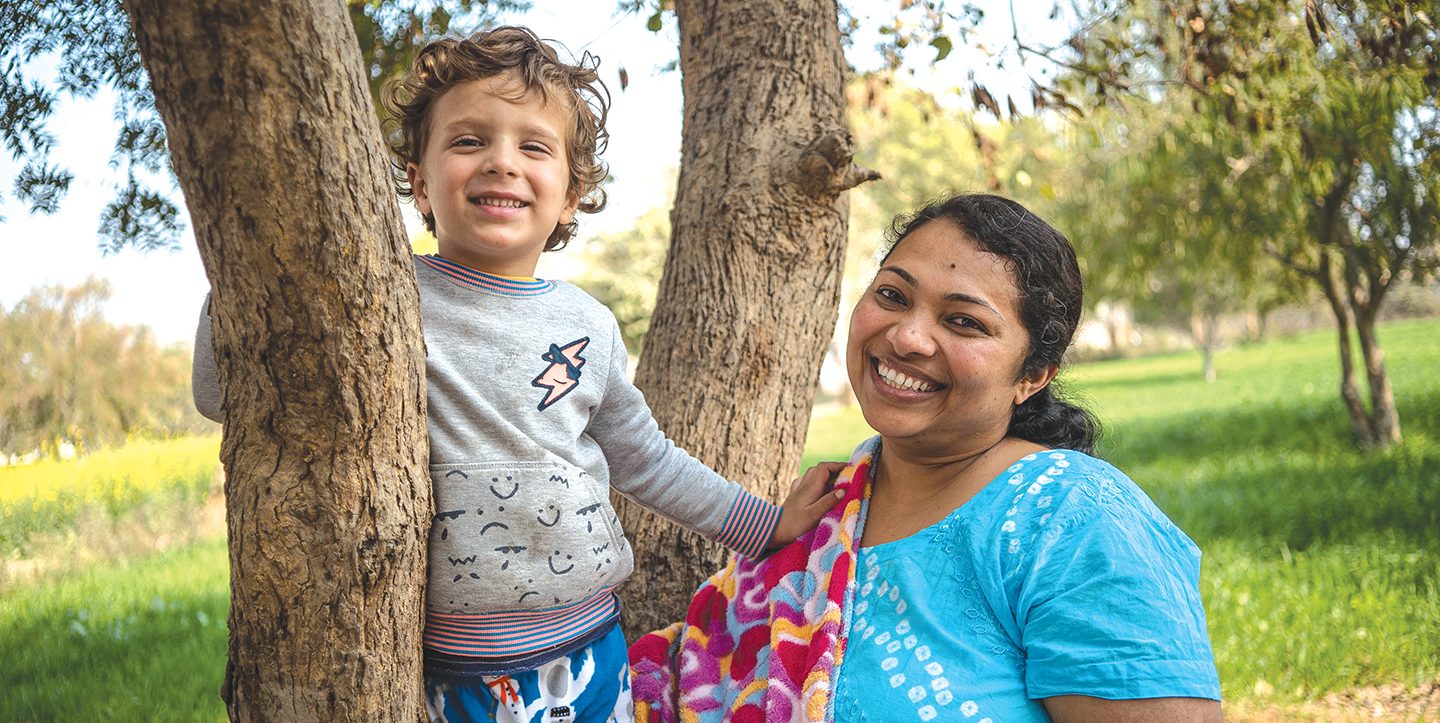He was known at Campbell for his big ideas and his love of people. With those attributes, Andy Lepper found his calling in India and became a father figure to hundreds before his untimely death.
By Kate Stoneburner | Photo by Blake Barlow
Blake Barlow wasn’t sure what to expect when he began planning a trip to India to help a nonprofit with media content. He saved for a year and a half to buy his $1,200 plane ticket to New Delhi, and he had only met his “client” Andy Lepper twice before being picked up at the airport that morning on what felt like a different planet.
But Barlow’s dream was to make movies, and with a couple of years of experience, he knew this was a once in a lifetime opportunity to both work toward his dream and help bring awareness to his client’s life’s work— providing a home to orphans in the city of Alwar.
What he saw and filmed during his time there was not an orphanage, but a family. And in Lepper, he did not find an overseer, but a true “papa” to that family, in both name and deed. Barlow’s short documentary, Make a Difference, is a beautiful testament to the difference Lepper and his wife, Susan, made in India.
And when Lepper died in May — one of India’s 393,000-plus victims of the COVID-19 pandemic that peaked in the country that same month — the film became a testament to Lepper’s legacy.
_________________

Andy Lepper first traveled to India in 1997 for a mission trip while a student at Campbell University. In his journal that year, he wrote that of all the communities he’d visited, God had spoken to him the most in Alwar, a city of nearly half a million people near New Delhi.
He wasn’t sure what his calling was at the time, but he prayed for God to send him back to Alwar. Over the next 20 years, he’d meet and marry a woman from Alwar, Susan, he would take over an orphanage in Alwar, and he would eventually call the city home to his life’s ministry.
After time, the orphanage ceased to feel like a ministry.
“When you adopt a child, you don’t look at that child as an orphan anymore,” Lepper told Barlow in 2019. “They are grafted into your family. So now when we decide to do [outreach ministry], our boys are praying with us and helping us … they are no longer the ministry, they are family. We have 30 of the most perfect beautiful sons in the world. More than anyone could ever ask for.”
No Longer Orphans supports 100 children in four locations around the country. Susan and their son Micah live at the headquarters, which houses 25 children on about 19 acres, with a soccer field and farmland that Lepper and the boys worked themselves. Other staff members, including Susan, grew up in a children’s home and share a special bond with the boys, who are mostly from poverty-stricken communities or separated from their families.
Lepper designed the nonprofit to give children stability and teach them self-sufficiency through a woodworking shop where they learn to make pens, bowls and guitars. The penchant for entrepreneurship, crafting and creating that Lepper passed on to so many was definitely evident years earlier during his time at Campbell, according to Ben White (’99), Lepper’s freshman roommate, eventual housemate and lifelong friend (Lepper was even in his wedding).
White has fond memories of Lepper’s creations — or, his “stuff,” as he’d call it.
“Our vacuum cleaner was always full of beads from Andy’s budding jewelry business,” White recalled. “He carried a briefcase around campus with him full of jewelry, not books. He turned our back porch shed into his office with a recliner, space heater and TV in it.”
Lepper, he said, was also a gracious host. He remembered rappers from New York City staying with them as guests for Lepper’s Peace Freak Festival, which he organized on campus. During the stay, he fed them with his Marshbanks meal card.
He also housed anyone from campus who needed shelter following Hurricane Fran in 1996.
“Here’s what I learned about Andy through all of this.” White said. “While he was a collector of stuff, he was even more so a collector of people. His heart must have been 10 times larger than the average human heart. He was a lover. He was a dreamer. He wrote books. He created websites to sell his jewelry [Chunky Junk] and pens [LOVOSO].
“He galvanized friends and family to share in his vision for what the Epistle of James calls pure and undefiled religion — to visit orphans and widows in their affliction [James 1:27].”
Every penny Lepper raised from his creative schemes was used for ministry. While he never earned his degree at Campbell, he stuck around campus, living nearby and traveling to India whenever he could. Everyone who encountered him came away with an “Andy story” about his latest project, plan or dream, and when one didn’t pan out, it was “on to the next” — an attitude that served him well in India.
“One thing Andy would always say is “adjust,” says Barlow. “We plan and plan and try so many things, he would say, but India has an infamous way of changing everything and you must adjust and go with it. From trains delayed for days to wrecked buses and everything in between, he had to adjust. I think about his words every day.”
_________________

Lepper and his family adjusted to so much in 2020. His blog relayed the trials that COVID-19 brought to India and the myriad ways that lockdowns impacted his family and their ministry.
“My calculations are 24 weeks without venturing more than 50 feet out of our front door,” he wrote in August 2020. “I will say that three of the staff members have ventured out carefully to help get us cash and get supplies here and there. But none of the boys nor I have gone out in 24 weeks! I have slowly been losing my mind.”
With Amazon supply chains down and donations scarce, food shortages became a daily reality for No Longer Orphans. And it could have been worse, if not for a hunch that Lepper had in February 2020. When he suggested that supplies would become scarce and instructed his staff to buy six months worth of food in one month, his staff looked at him as though he had two heads. Despite protests over waste, he insisted that headquarters buy a stockpile of essential food, rice, wheat, oil and lentils. Everything else was a luxury.
His hunch came true. In summer 2020, it was estimated in India that more people would starve than die of complications from the virus. The orphanage had become a beacon in the community, and when many in the village were left with little food, people would come under cover of darkness to ask for enough to survive. Lepper never turned anyone away. Sometimes with food from the storeroom — other times with cash — he would always help.
“Although I had a ‘hunker down’ mentality and a small part of me wanted to save everything in case things got worse, the humanity in me kicked in, and we ended up helping every single person who came to us,” he wrote.
“We saw firsthand people who were not eating so that their children could eat. Think about that. I don’t think many people in the West have had to endure that. I am not demeaning the West by any means. I am just sharing the reality of what we and those around us have gone through the last six months.”
Lepper estimated that between food and cash, No Longer Orphans gave away well over 10,000 meals to local people in a six month span through August 2020, when he wrote his last blog post. By the time of his passing, it was surely more.
Just like he prayed in 1997, Lepper would throw in his lot with the people of Alwar, India, until the very end. All who knew him knew a picture of true humility and Christ-like gentleness — a man who loved to laugh and who made a deep impression on everyone he met, whether they encountered him at Campbell with a briefcase full of wares, or halfway across the world at a dance party at the orphanage.
Though too short, Andy Lepper’s life was spent becoming a father to the fatherless and inspiring others to do the same. It was a life well-lived.

